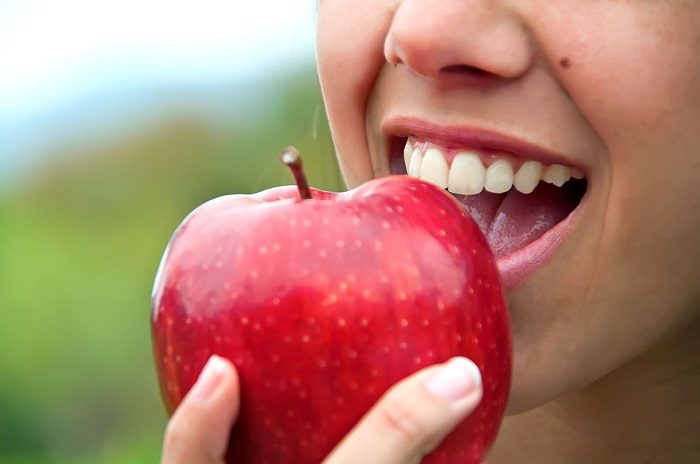You have likely heard the phrase: “you are what you eat.” This implies that the foods and beverages you consume play a role in your overall well-being. This concept proves true for your oral health too, especially your gums.
Which Foods Keep Gums Healthy?
Certain foods can hurt your teeth and gums, but your diet can also work to keep your smile looking and feeling its best as well. You can better focus on proper care for your gums, in particular, when you know which foods will promote good periodontal health. Read on to discover four examples of foods that can keep your gums healthy.

Apples
Famously, people claim an apple a day keeps the doctor away. But eating apples regularly can make your dentist or periodontist happy as well. Apples and other fruits with fibrous exteriors help to keep your teeth clean as you eat them.
This is because crunching on apples will scrape away plaque build-up and other residues from your teeth as you chew. This boosts oral hygiene, which will stop natural oral bacteria from spreading as easily across your teeth.
As a result, you can see a lower chance of oral infections like gum disease. Gum disease refers to an infection in the gum tissue that can cause serious harm to your smile.
It also requires a dentist’s intervention to treat, so you should prevent contracting it as much as you can. This entails at-home efforts like good oral hygiene and a balanced diet.
Yogurt
Dentists encourage their patients to consume dairy products like yogurt regularly to build strength in their teeth through calcium. But yogurt, in particular, can also keep your gums healthy.
Yogurt contains probiotics that work to balance bacteria throughout the body, including in the mouth. This will help prevent excess bacteria from spreading and infecting gum tissue. Stave off gum disease by eating yogurt when you can.
Salmon
Salmon and other oily fish are rich in omega-3s. This type of essential fat is suggested to carry anti-inflammatory properties. This means they work to reduce inflammation throughout the body, which can wreak havoc systemically, even when an infection starts in one certain area of the body, such as the gums.
Gum disease creates inflammation in the gum tissue, and anti-inflammatory elements, like what is in salmon, can reduce these uncomfortable symptoms. The infection can make the gums swell, bleed, and feel sore, and it can bring relief to alleviate these concerns. You must still seek treatment from a dentist to eradicate gum disease completely though.
Water
Some people may argue that water does not count as food. But no one can deny the benefits drinking water can bring to your gum health. If you do not drink enough water, you become dehydrated, which may make you produce less saliva than usual as a result.
This can leave you with dry mouth, a condition that feels unpleasant but also allows bacteria to spread with greater ease across the teeth. Then you can carry a higher risk of gum disease.
Drinking plenty of water reduces this risk and boosts oral hygiene by rinsing the mouth as you drink. Find more preventative periodontal care and advice by calling your dentist.
